Insights

Why does China’s Personal Information Protection Law matter to Australian organisations?
Should Australian organisations, even those that don’t have a Chinese market for their products or services, care about China’s new privacy law? On 1 November 2021, China’s Personal Information Protection Law (PIPL) commenced in the People’s Republic of China. The PIPL establishes a framework for collection, storage and disclosure of personal information. This wide-reaching jurisdictional approach of the PIPL is similar...

The importance of effective leadership in a volatile environment
Those faced with leading organisations in current volatile environments clearly encounter significant challenges. Effective leaders are those who have the skills to make good decisions in an ambiguous environment, and develop opportunities through innovation to gain a competitive advantage. They are highly valuable to organisations. [i] Leadership styles There are numerous models of leadership, for example: transformational...

Worth fighting about: risk identification
What is the most important step in the risk management process? While some professionals, including my friend Dr David Hillson, the Risk Doctor contend the most important step is the Risk Treatment step (Controls/Mitigation). They support this view by pointing out it is only in this step where you “actually do something to manage risk”. I (secretly) strongly agree with Dr Hillson, as that it is perhaps the first step...

Building rapport during online dispute resolution: different, difficult, doable
The rapidly changing court protocols amidst the COVID-19 pandemic have posed tremendous challenges for barristers, solicitors and their clients. With dispute resolution and mediation via video technologies becoming a more typical way of resolving legal disputes, setting the right tone quickly can be critical to a successful outcome on the day. So how do you quickly build rapport when meeting online? It wouldn't...

The pen is not mightier than the sword…or Zoom
At last, permanent reform for companies on electronic signing and virtual meetings Michelle Sim – Senior Legal Writer, LexisNexis® Practical Guidance Banking & Finance Michelle Wibisono – Senior Legal Writer, LexisNexis Practical Guidance Corporations Kathryn Schultz – Senior Legal Writer, LexisNexis Practical Guidance Mergers & Acquisitions In this article, three expert writers from LexisNexis Practical Guidance...

The COVID-19 vaccine claims scheme explained
Introduction: Vaccination against COVID-19 is the most effective way to reduce deaths and severe illness from infection. However, vaccines may cause side effects which on rare occasions extend to serious adverse outcomes. [1] On 2 July 2021, Greg Hunt, Minister for Health and Ageing, announced “a COVID-19 Vaccine Claim Scheme.” [2] The Vaccine Claims Scheme (VCS) enables individuals who suffer a significant adverse...

Legal professional privilege: A tale of two judgments
Can common law legal professional privilege truly be claimed over electronic communications? Did the High Court in its Expense Reduction and Glencore decisions give tangible guidance as to how the doctrine of legal professional privilege can provide answers to the problems created by misuse of technology? Expert author and barrister RJ Desiatnik analyses these two recent unanimous High Court judgments concerning the...

Q & A with barrister Farid Assaf SC, author of Assaf’s Winding Up in Insolvency 3rd edition
Assaf’s Winding Up in Insolvency 3rd edition (earlier known as Statutory Demands and Winding Up in Insolvency) is an essential practical reference text providing comprehensive treatment of all aspects of winding up in insolvency. We took the opportunity to ask Farid Assaf SC of Banco Chambers a few questions about the text. Q: Why the new title? The new work is about all aspects of winding up in insolvency. To reflect...
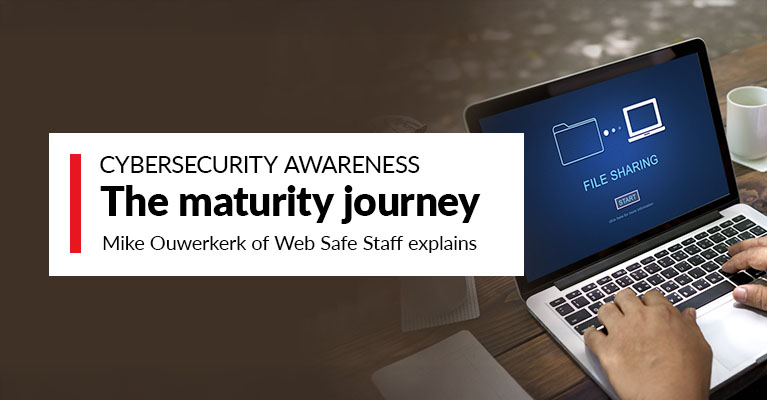
Cybersecurity awareness: The maturity journey
It’s becoming increasingly obvious that in order to mitigate cyber security risk, companies need to train their staff in how to identify and respond to IT threats. When over 90% of IT breaches are via staff, it would be prudent to accept this as major risk. In its simplest form, there are three stages in the cyber security awareness maturity model: Compliance Do some awareness training Don’t focus too much...

Insider Threat
We are living in a very complex world filled with vulnerability and uncertainty, where anyone, externally or internally, can cause harm to you and your organisation. When a person with authorised access to organisational resources becomes an adversary, they are deemed an “insider threat”, which refers to an insider who wittingly or unwittingly does harm to the organisation. Examples are sabotage, espionage, terrorism...

The next chapter in the Modernising Business Registers program
The implementation of the Modernising Business Registers (MBR) program is picking up its pace, after a slow start. The MBR program originated in the 2016 National Business Simplification Initiative , which had the aim of reducing the burden of unnecessary regulation and improving, centralising and streamlining access to government information and services. Following extensive consultation, the Government rolled out the...

Privacy and the search for suspects using forensic genetic genealogy
“ There’s no such thing as anonymity anymore ” quotes Nathan Scudder of the University of Technology in a recent article inside the Privacy Law Bulletin . He asks, “…are we now at a point where — if enough investigative time and effort is applied —can almost any suspect can be identified from their discarded DNA ?” The increase in publicly available genetic data presents investigators of cold cases with potential leads...

Will data-driven law firms act differently to the top firms of today?
“Analytics”, “Artificial Intelligence”, “Machine Learning” – these have become the ubiquitous catch cries of our world, the fear mongering we hear at conferences about what is about to hit our firms. They describe a future wholly different from the present, where the very fabric of the law firm is irreparably changed. Yet this future never seems to arrive. The promised disruption seems close but still thankfully just...

The Long Tail of COVID-19: Prevailing trends in civil litigation in 2021 and beyond
With the impending rollout of the COVID-19 vaccine in Australia and across much of the world, the business and legal community is beginning to look forward to the resumption of the so-called ‘new normal’. It is clear, however, that the aftershocks of the pandemic will be felt throughout 2021 and beyond, and that law firms will need to adapt to accommodate the lasting impacts of the virus on the legal industry. While these...

Combustible Cladding: A lesson on the administration of law on liability
The fires at the Grenfell Tower in London in 2017 and the Lacrosse building in Melbourne in 2014 have resulted in new laws for buildings with external combustible cladding. New South Wales has experienced issues with defective buildings at Erskineville, Mascot and Sydney Olympic Park. There have been various approaches to dealing with these issues in different state jurisdictions. New South Wales The State Government...

Virtual training sessions Q&A with Jaya Ralph
Here at LexisNexis our tailored in-person training and dial-in webinars are built around your annual plans, allowing you to map out your training strategy over a 12 to 24-month period. However, 2020 posed new challenges and our training sessions needed to adapt quickly to a completely virtual training experience. Here we talk to Jaya Ralph, Law Faculty Librarian at Curtin University about her experience and the unique...
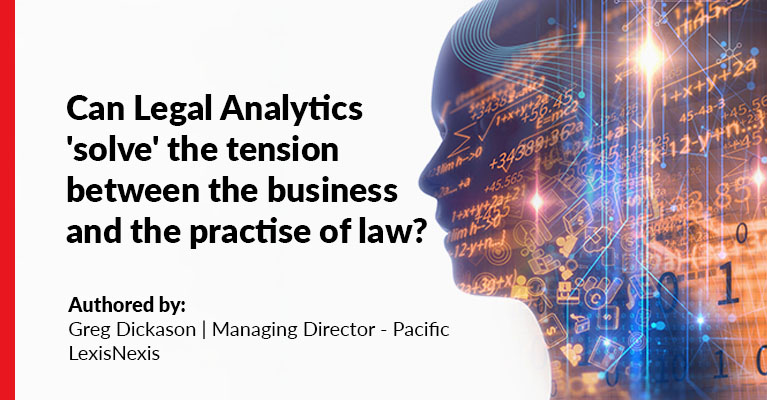
Can Legal Analytics ‘solve’ the tension between the business and the practise of law?
Marrying the business and the practise of law is hard. You need to produce quality work, to a tight timeline, and often with a client who expects perfection at a low price. Efficiency in the process cannot compromise you utilising the intellectual knowledge you have built up as a practising lawyer. Your client expects your experience, brought to bear on the exact nuances of fact and law of their matter. Well-designed...
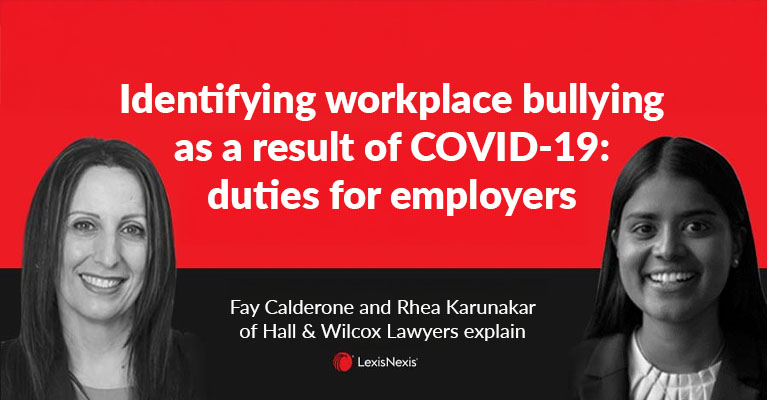
Identifying workplace bullying as a result of COVID-19: Duties for employers
With the increase in employees now working from home full time, employers need to be aware of new and additional pressures on individuals that can be significant risk factors for workplace bullying. Even when working from home, employees are at risk of workplace bullying, however employers should be aware that certain groups of employees may be at a greater risk of feeling marginalised at this time. Employees with mental...

Respect at work, safe workplaces remain far from reach for Australian employees
Amid headlines listing COVID numbers & quarantine mishandling incidents across the states, Australia attracted global attention earlier this year with stories emerging from Parliament that detailed sexual harassment, assault, inappropriate behaviour, bullying and unequal treatment of women dedicated to careers in politics. This was hardly a revelation for women in politics, or in any profession, yet vastly uncomfortable...

Commercial leases under strain as emergency protections roll back
State and territory Governments throughout Australia responded to the economic downturn wrought by the COVID-19 pandemic by allowing temporary relief to commercial tenants from their rental and trading obligations last year. Yet as the country and the economy begin to recover, this measure is slated to end abruptly. Commercial property holders looking to regain the ability to draw rental income from their investments...

Security of Payment in Construction
Over the last decade, security of payment legislation has been introduced in all Australian jurisdictions as follows: NSW: The Building and Construction Industry Security of Payment Act 1999 VIC: The Building and Construction Industry Security of Payment Act 2002 WA: The Construction Contracts Act 2004 NT: Construction Contracts (Security of Payments) Act 2004 SA: The Building and Construction Industry Security of Payment...

Balancing the risks of new technology: The intersection of technology, risk management, operations and governance
Adopting new technology has risks. Not adopting new technology has risks. How are you balancing them? Leading governance professionals around the world are grappling with how to balance these questions. New perspectives are revealed inside a new LexisNexis whitepaper, ‘ How technology is rewriting the risk management landscape, and how to govern the new opportunities and risks presented ’. Read the whitepaper During...
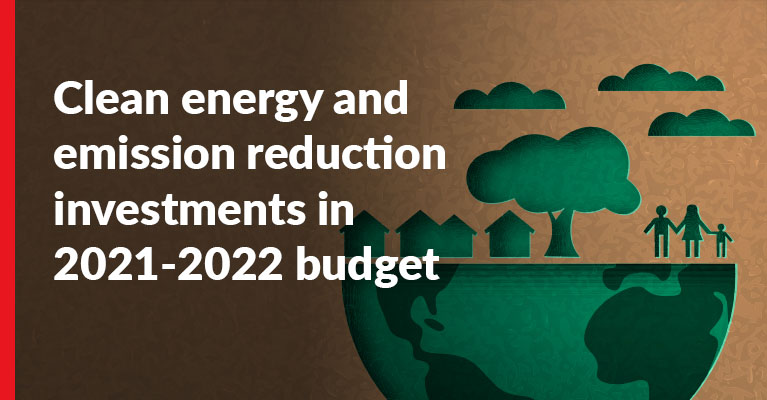
Clean energy and emissions reduction investments in 2021-22 Budget
The Morrison Government has pledged nearly $1.8 billion in energy and emissions reductions in recent weeks, an investment that is expected to form a plank in the upcoming May Budget. The announcements were made in the lead up to the virtual Leaders’ Climate Summit, convened by US President Joe Biden, and held on 22-23 April. On his first day in office, US President Biden re-established the US’ commitment to the Paris...
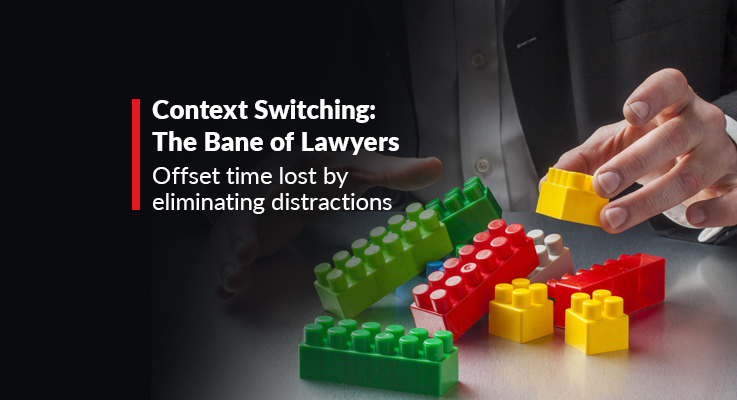
Context Switching: The Bane of Lawyers
Today’s lawyer must contend with a wide variety of distractions. Context switching, in particular, is mentioned time and time again as one of the most hated time sappers. Carrying out legal work on computers and other internet connected devices brings valuable efficiencies for law firms, not least fast client communication and effortless access to relevant legal intelligence. However, the seemingly never-ending stream...

Electronic signing, virtual meetings, and continuous disclosure: the current state of play and progress on permanent reform
Australian companies can continue to enjoy the current flexibility in using technology to sign documents and hold meetings, as the existing temporary relief measures remain in effect until 31 March 2022. Additionally, significant permanent reforms to continuous disclosure became effective on 14 August 2021, enabling companies to balance appropriate disclosure to the market against ensuring they can confidently release...